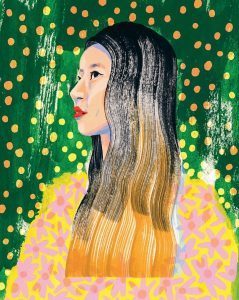Dan Chiasson at The New Yorker:
 Sally Wen Mao’s new book of poems, “Oculus,” borrows its slightly menacing title from the Latin word for “eye,” which also refers to, among other things, a virtual-reality company and the eye-shaped skylight at the Guggenheim Museum in New York City. There are eyes everywhere in “Oculus,” but not all of them are blessed with sight. Some are all-seeing, panoptic; others are yearning and blinkered, unable to return the gaze they attract. These poems are haunted by images of human faces staring out from all kinds of screens, faces that are themselves screens upon which the world projects its fantasies and anxieties. “The stories about our lives do not have faces,” Mao writes. Her strange and morally succinct book is, in part, a sustained defense of writing. Mao’s poems intervene in a culture glutted with visual images, on behalf of what she calls “the self you want to hide”—the “sad, pretty thing,” lost behind the images. “Because being seen,” she writes elsewhere, “has a different meaning to someone / with my face.”
Sally Wen Mao’s new book of poems, “Oculus,” borrows its slightly menacing title from the Latin word for “eye,” which also refers to, among other things, a virtual-reality company and the eye-shaped skylight at the Guggenheim Museum in New York City. There are eyes everywhere in “Oculus,” but not all of them are blessed with sight. Some are all-seeing, panoptic; others are yearning and blinkered, unable to return the gaze they attract. These poems are haunted by images of human faces staring out from all kinds of screens, faces that are themselves screens upon which the world projects its fantasies and anxieties. “The stories about our lives do not have faces,” Mao writes. Her strange and morally succinct book is, in part, a sustained defense of writing. Mao’s poems intervene in a culture glutted with visual images, on behalf of what she calls “the self you want to hide”—the “sad, pretty thing,” lost behind the images. “Because being seen,” she writes elsewhere, “has a different meaning to someone / with my face.”
more here.
